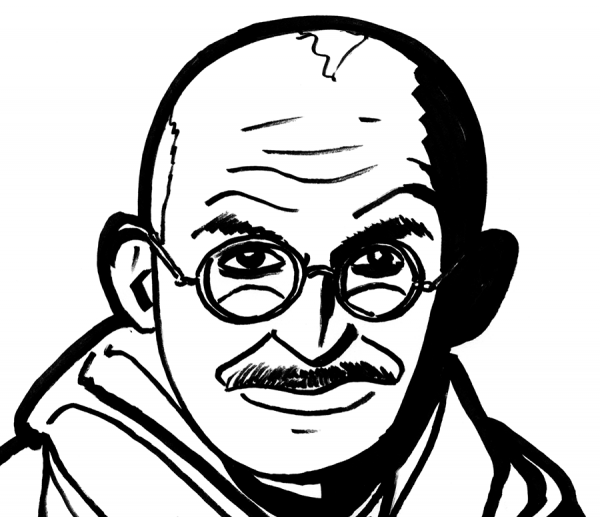
The Crucifixion puts everything into perspective. No matter what we face in life, no matter how bad things get, it’s hard to top an innocent man being tortured to death for telling the truth in a political kangaroo court - which, essentially, is the story of Jesus’s death.
This is a strange comfort for me when I think I’ve had a bad day. No matter what minor mishap has triggered my internal narrative and constant catastrophizing, it really never is as bad as what Jesus had to go through to protect us from the consequences of our own sins.
I feel strange even writing this. It seems like this is something that should be treated with heavy reverence - the Crucifixion is the most important event in Christian theology, and in that view, is the most important thing to ever happen in all of Creation itself.
But the reverence of a prayer to our God - as regurgitated performatively to other true believers, which is what all audible or written prayers are, performances - leads to language which is the opposite of clear explanation and honest sharing with people who do not yet believe.
Think of the exaggerated “JAY-zuss” you hear from televangelists. Jesus actually tells us not to pray in public: “When you pray, you shall not be as the hypocrites, for they love to stand and pray in the synagogues and in the corners of the streets, that they may be seen by men.”
Or think of the constant praises that Muslims offer to Allah in religious contexts: Allah, may He be glorified and exalted”, “Muhammad, upon him be prayers and peace.” In a sense, this is a performance, something which reads the best to other believers.
But in another sense, these praises and exaggerations are not a performance. While I’m leery of taking much from any other faith into Christianity, especially Islam, which C. S. Lewis described as “Christianity’s greatest heresy,” one thing that I agree with Islam about is submission to God.
Islam means submission to God, and as part of that submission, Muslims believe in gratitude, which leads to thanks and praise to God, and Muslims believe in scripture, citing verses from the Qur’an as a reason to bestow on Muhammad all those honorifics.
Similarly, to a televangelist, belief in Jesus is the most important element of anyone’s life. He’s their guide, their Savior, their close personal friend, even if He is invisible, and every time they say His name, they want to emphasize His importance to them.
In Christian theology, Jesus is God, existing before and outside Creation; but Jesus is also human, making Him the most important part of Creation - and the Crucifixion, Death and Resurrection the most important event.
That’s why the Crucifixion looms so large: in a sense, it is both everywhere and at the center of things. The authors G. K. Chesterton and C. S. Lewis both had a genius for metaphor when talking about the Risen Lord, often using the imagery of the Sun when they did so.
That’s appropriate. The Earth turns, and sometimes, its weight and bulk seems like it blots out the Sun. But the Sun is always there, still burning, shining its light into every part of the darkness, and it will be waiting for us when it turns around again.
The light of the Sun predates the formation of the Earth, which took its current shape after the Mars-sized planet Theia slammed into the proto-Earth (which in my novels I call Hyperion), and it will shine after the Earth is gone, consumed in the swelling of the Sun into a red giant.
This is one reason I’m not so worried about the discrepancies between the Bible and modern cosmology: the world wasn’t made in six days and it won’t end in seven trumpets, but echoes of those spiritual truths can be found over and over again, fractally, throughout the universe.
And the largest of those looming truths is that of the Son. Like the Sun, He was here before us, His light shaped us and helped us grow, and He will be here long after we’re gone, collecting the dust of the old world and refashioning it into a new one.
So today, the echoes of the Crucifixion wash over us; tomorrow, that of his Death; the day after, that of his Resurrection. And the lesson, even for our worst suffering and our darkest hours, is that suffering, followed by death, is a mere echo of a process that ends in Resurrection.
-the Centaur
Pictured: G. K. Chesterton. Dude had some hair.
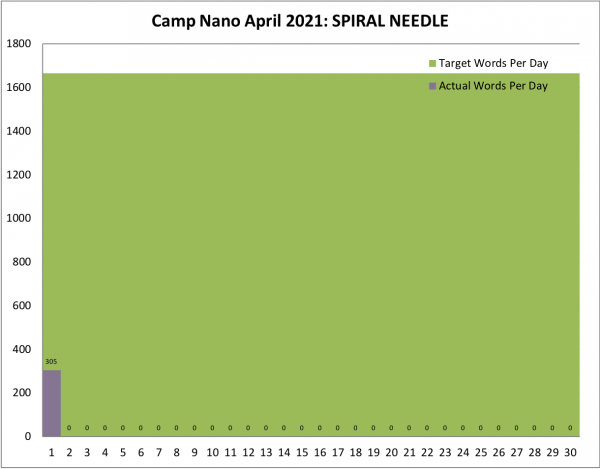 Taking on Dakota Frost, Book 7. Added 305 words. A raw unedited excerpt (including some prior text from Tuesday for context):
Taking on Dakota Frost, Book 7. Added 305 words. A raw unedited excerpt (including some prior text from Tuesday for context):
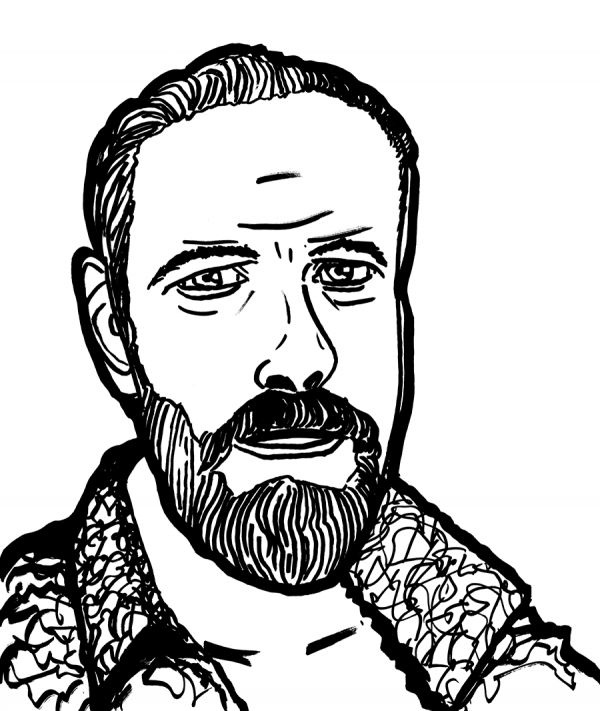 Quick sketch of PKD. His face got a bit distorted, but it's not terrible, methinks.
Quick sketch of PKD. His face got a bit distorted, but it's not terrible, methinks.
 Also, I did the following sketch on a box of the roleplaying game Lace and Steel, which is "centaurs and friends in the age of the Three Musketeers." I'd lost the original box somehow - I seem to recall it being mis-sized or having something wrong with the cover - and the generic white box was easy to lose in the shelves. So I quickly flipped through the character book - AMAZING art by Donna Barr, as I recall - and drew, without roughs, the following character on the cover of the white box, so I could find it later:
Also, I did the following sketch on a box of the roleplaying game Lace and Steel, which is "centaurs and friends in the age of the Three Musketeers." I'd lost the original box somehow - I seem to recall it being mis-sized or having something wrong with the cover - and the generic white box was easy to lose in the shelves. So I quickly flipped through the character book - AMAZING art by Donna Barr, as I recall - and drew, without roughs, the following character on the cover of the white box, so I could find it later:
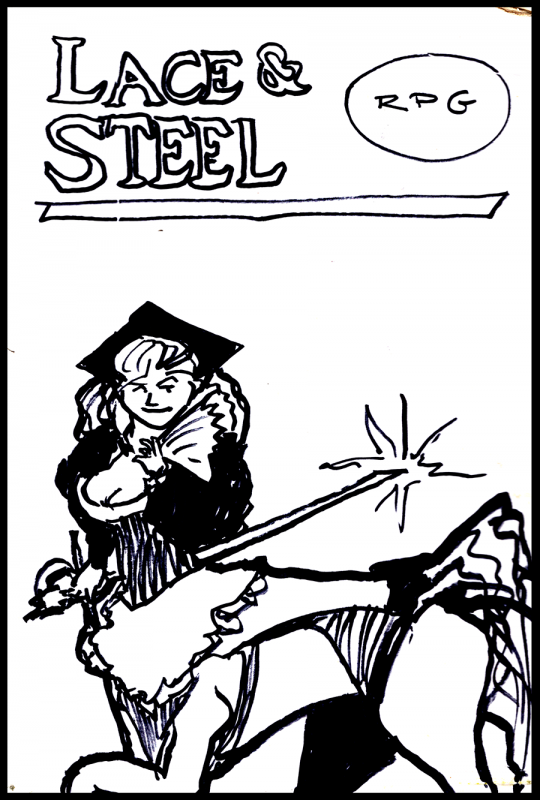 Centaurs and rapiers and Sharpies, oh my.
Drawing every day.
-the Centaur
Centaurs and rapiers and Sharpies, oh my.
Drawing every day.
-the Centaur 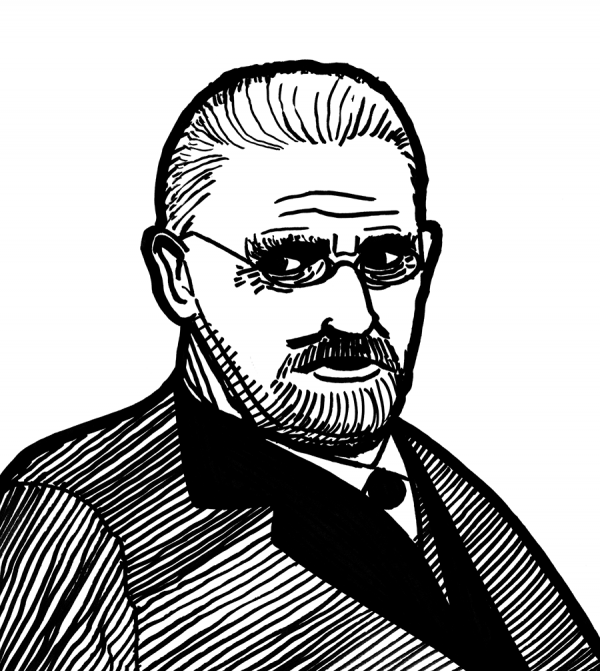 Quick Sharpie sketch of Richard Dedekind. I think I squished him a little, and with the Sharpies it's hard to get eyes pointed right. And his neck kind of stretched down a bit on the left. But I'm not super unhappy with this one. And it means I get to bed 30 minutes earlier than otherwise expected.
Quick Sharpie sketch of Richard Dedekind. I think I squished him a little, and with the Sharpies it's hard to get eyes pointed right. And his neck kind of stretched down a bit on the left. But I'm not super unhappy with this one. And it means I get to bed 30 minutes earlier than otherwise expected.
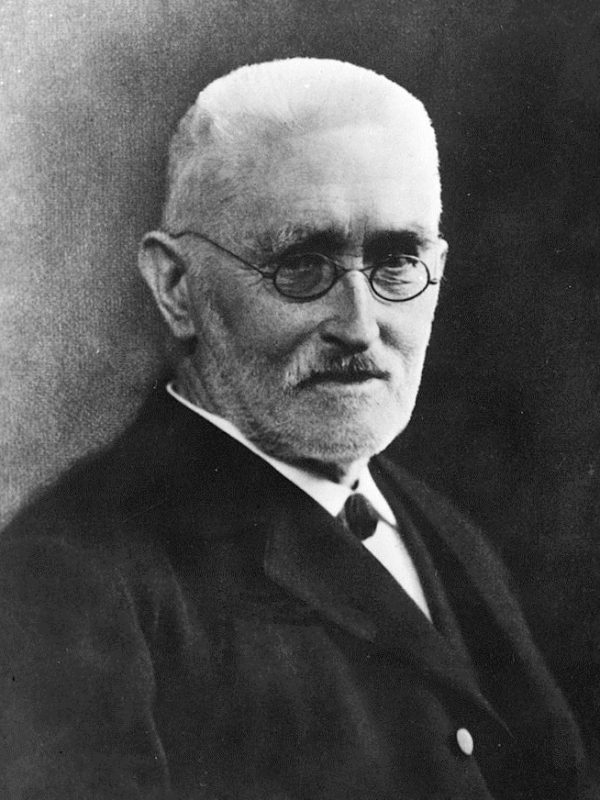 Drawing every day.
-the Centaur
Drawing every day.
-the Centaur 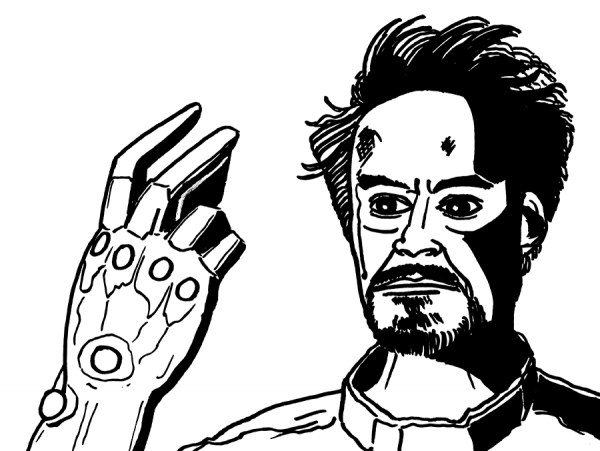 Quick sketch of Tony Stark as Iron Man. In an interesting reversal, I think the picture below looks a little squashed, and I unconsciously stretched his face back up to a more normal proportion. Actually, this one wasn't totally terrible - I had to learn a language for drawing the hair, and to pick which parts of the drawing I was going to render as pure black. Also, contra my earlier suggestions, the Sharpie wasn't totally permanent; I actually used whiteout to fix one overwritten line - can you tell where?
Quick sketch of Tony Stark as Iron Man. In an interesting reversal, I think the picture below looks a little squashed, and I unconsciously stretched his face back up to a more normal proportion. Actually, this one wasn't totally terrible - I had to learn a language for drawing the hair, and to pick which parts of the drawing I was going to render as pure black. Also, contra my earlier suggestions, the Sharpie wasn't totally permanent; I actually used whiteout to fix one overwritten line - can you tell where?
 Drawing every day.
-the Centaur
Drawing every day.
-the Centaur 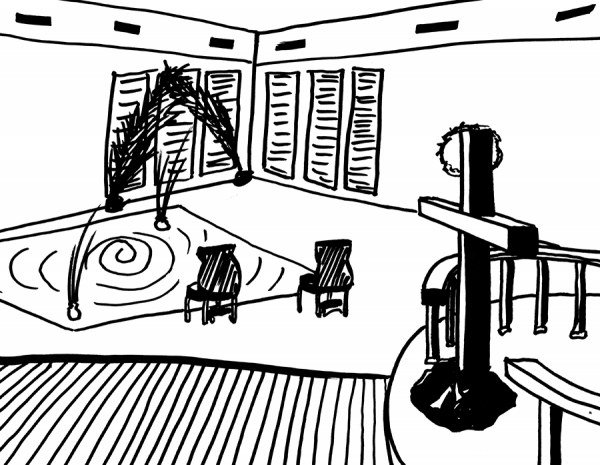 Still stuck on Sharpie drawings while I am simultaneously (a) doing a Lenten series (b) unpacking my library as it is shipped from California and (c) dealing with end-of-quarter objectives ("OKRs"). Above is a drawing of Saint Stephens in-the-Field as set up for Good Friday Vigil: I deliberately simplified it as there's no point in doing a super-detailed drawing when you're trying to do it super-quick. Still, I discovered, as I was drawing the simple shapes of the Cross, something I've suspected: my lines have a wobble to them. This could be practice, or it could be a lingering side effect of my serious RSI episode in the late '90's, which I am still managing to this day (typing this on a lowered keyboard tray as we speak).
Still stuck on Sharpie drawings while I am simultaneously (a) doing a Lenten series (b) unpacking my library as it is shipped from California and (c) dealing with end-of-quarter objectives ("OKRs"). Above is a drawing of Saint Stephens in-the-Field as set up for Good Friday Vigil: I deliberately simplified it as there's no point in doing a super-detailed drawing when you're trying to do it super-quick. Still, I discovered, as I was drawing the simple shapes of the Cross, something I've suspected: my lines have a wobble to them. This could be practice, or it could be a lingering side effect of my serious RSI episode in the late '90's, which I am still managing to this day (typing this on a lowered keyboard tray as we speak).
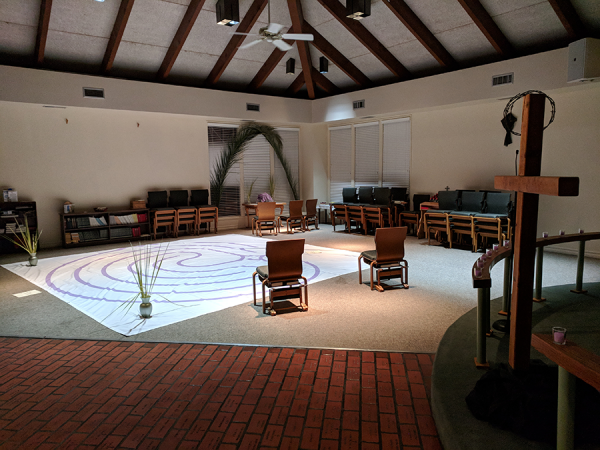 Drawing every day.
-the Centaur
Drawing every day.
-the Centaur 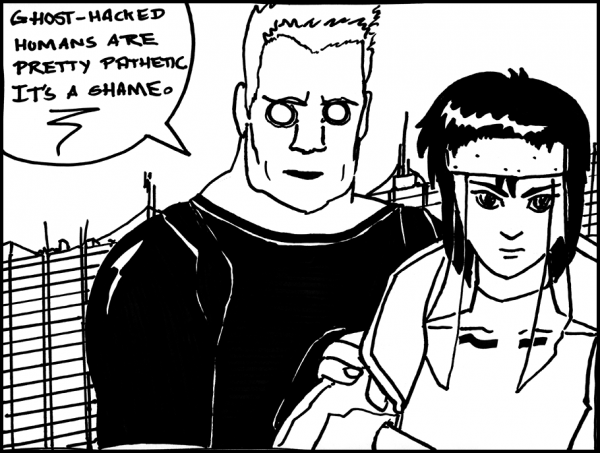 Quick Sharpie sketch of a scene from Ghost in the Shell. Man, it is hard doing this when every line that lands has landed forever - the landscape and proportions of the features are so hard to get right.
Quick Sharpie sketch of a scene from Ghost in the Shell. Man, it is hard doing this when every line that lands has landed forever - the landscape and proportions of the features are so hard to get right.
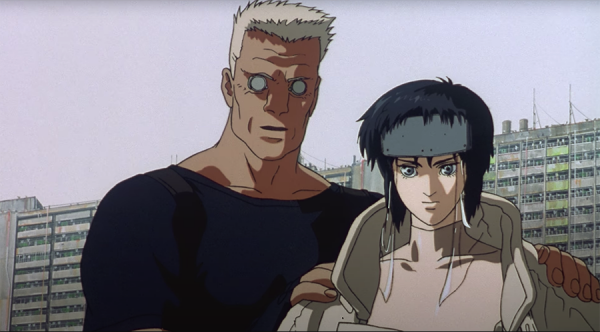 Still, drawing every day.
-the Centaur
Still, drawing every day.
-the Centaur 
 John Dee, again with the Sharpie sketches. I like the layout of the face better this time, but while it gives me practice on overall shapes, the resolution of the Sharpies is so broad that it makes it impossible to do a good rendering. So that which makes it easy to do a drawing makes it hard to do it right.
John Dee, again with the Sharpie sketches. I like the layout of the face better this time, but while it gives me practice on overall shapes, the resolution of the Sharpies is so broad that it makes it impossible to do a good rendering. So that which makes it easy to do a drawing makes it hard to do it right.
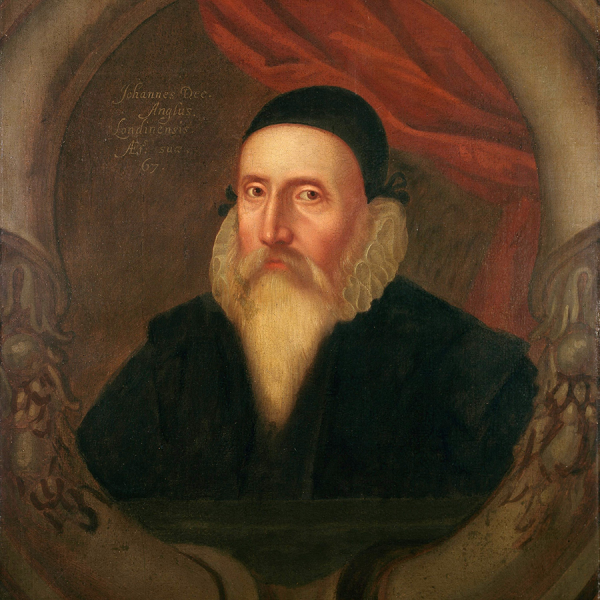 Still, drawing every day.
-the Centaur
Still, drawing every day.
-the Centaur  I'm an odd fellow, spending a lot of my time (pre-pandemic) reading books and papers in nice restaurants to the bemusement of the staff, followed by writing and drawing in nice coffeehouses the hustle and bustle to drowns out everything else so I can focus on what I am doing.
While this doesn't seem weird to me, it seems unusual enough to others that I attract the interested attention of quite a few interesting characters - some of whom frequent the same set of late-night coffeehouses, so we bump into each other again and again.
It's through them that I got my introduction to Christian mysticism - dare I even say Christian wizardy? For someone who grew up steeped in the Roman Catholic tradition - and embedded in a deeply fundamentalist region of the Bible Belt - this mixture seems deeply weird to me.
To understand this, what we'd call "witchcraft" is proscribed in the Old Testament, which prescribes the death penalty for several forms of necromancy. In the King James Version, there's the famous verse "Thou shalt not suffer a witch to live," though my Interlinear Bible translates that as "sorceress."
Following this tradition, many Catholics and fundamentalists view "magic and witchcraft" as literally "satanic," which is another way of saying that they created a cute little thesaurus of suitcase words for their delusions into which they put everything that they're scared of, like Pandora's Box in reverse.
But there's no "there" there, or, to make my snark a little more plain: the "magic" and "witchcraft" and "satanism" which so many Christians love to fear do not actually exist, at least not in the forms that you'll find in a Jack Chick tract or a worried letter from St. Mary's about the dangers of Dungeons and Dragons.
Again to be clear, it's not that there aren't people who believe in magic, what we might call witchcraft, and even satanism - I used to date a Wiccan, and I know several people who practice magic, some of them longtime friends - including at least one Christian "wizard" who inspired this article.
But those "practices," if you can call them that, don't line up with the hyperbolic and borderline delusional way Christians seem to describe them. It seems like there's something really weird going on in the human psyche which makes people want to make up stuff about the out-group.
At one Bible study I attended, all three of my fellow students started going on about the "dangers" of "crystals" and how they were a gateway to the satanic. To my skeptical ears, this all sounded like a bunch of cosmic woo-woo, only they ascribed much more reality to it than my Wiccan friends.
One of the properties of "real" magic, if you can call it that, is that it only makes itself visible to the prepared mind. When a "practitioner" of "magick" casts a spell designed to grant them greater calm or to help them win over a colleague, only a person looking for the signs, can tell that it happened.
This is the exact opposite of the scientific method. The business science is in is getting traction - making our results, from pure mathematics to fundamental physics to applied engineering, appear reliably and repeatedly to others following unambiguous written instructions rather than mental indoctrination.
Of course, it's not that simple. Reportedly, Faraday's early induction experiments were very finicky, and early experimenters needed to be instructed on how to see the effects. But after a lot of development, the law today is extraordinarily reliable, part of the machinery of electromagnetism and special relativity.
Which is a roundabout way of saying that my assumptions that "crystals" are "woo" and that "magic" doesn't "work" are just that, assumptions. (I stand by my statement that the Christian concept of "witchcraft" is not connected to reality, as magical practices are well studied in anthropology.)
Regardless of whether these Christian attitudes towards magic are real, they were pervasive when I was growing up, so much so that they heavily informed my design of the magic system of Dakota Frost, where my "skeptical witch" is also a Christian who'd rather die than make a deal with the devil.
Finding out that there are Christians who practice magic - and, we're talking, like, hard-core Christians, people whom you'd easily mistake for an independent Baptist preacher - was therefore somewhat mindblowing. This is a sign how insular we can become if we only talk to our own in-groups.
Imagine my surprise when, at one of my favorite coffeehouses, a Vietnam veteran who I normally chatted with about Christian theology suddenly started talking about wizardry, being granted power by angels, and how he had noticed my "energy" gave off a particularly intense "aura".
If I could sum up my friend's theology, it would go something like this: the Bible is literally true, and we're called on to act with humility, charity and forgiveness. But also literally true are all the conspiracy theories shared by your eccentrically religious uncle or favorite nun about vaccines or satanism or whatever.
But that's just the surface to my friend: to him, God is really acting with grace in the world, and has sent his angels to empower people to accomplish various tasks. Christians who accept God can sometimes be given glimpses of this order, and if they choose to go down this path, may receive power.
I ... am ... relatively ... certain this notion would have set some of my childhood fundamentalist friends on fire, right before they warned me that whoever this guy thought he was talking to, it was likely not God. But nonetheless, I can say from many conversations, the rest of this guy's theology is spot on.
In fact, I'd really call him one of the more spiritually mature people that I've talked to. But nevertheless, he recommended to me several books, some of which were completely innocuous self-help books, and others like The Teachings of Don Juan by Carlos Casteneda, a book about shamanism.
My friend warned me, "You need to make sure you are spiritually prepared, mature and solid as a Christian, before you decide to go on this journey. If you go rattling the doors of reality and you aren't properly spiritually armored, you can expect some things to come a rapping."
Things coming a rapping? That was enough: I decided I don't need to go on that journey. To paraphrase a character in The Blair Witch Project, if that shit isn't real, I don't need to go putting it in my head, and if it is real ... I definitely don't need to go putting that in my head.
My friend's experiences are consistent with what I've heard from my Wiccan friends, in that getting involved in magic and spellcasting without proper guidance and preparation can open you up to spiritual attack. My fundamentalist friends would say the same thing about Tarot cards and the Ouija board.
Well, the Ouija board is a trademark of Hasbro, Incorporated, and was originally an innocent parlor game, and the Tarot itself may have developed out of an innocent game as well before it was used for divination. But one thing I'll agree with all these friends about is the idea of spiritual attack.
C. S. Lewis's The Screwtape Letters describe a senior devil trying to advise a junior devil on how to damn a soul - but this has precedent in Christian phenomenology, where many religious folks seem to have noticed that sometimes we seem to come under a relentless assault when we're vulnerable.
Whether this is real or not, we do get into situations in which we are vulnerable. One of my friends, an ex-fundamentalist turned radical atheist, describes this as "the whammy": when we're hit by a sequence of things, each one of which we might be able to handle, but when combined, become overwhelming.
This feeling - the feeling that we can't handle it - what Christians would call despair - is largely an illusion. If demons are real, despair is the state they seek to induce to make us make bad choices. If demons aren't real, we're doing this to ourselves - a state cognitive behavior therapists call catastrophizing.
Catastrophizing feels like a natural reaction to a terrible situation, but it's really a form of self-narrative that causes us to exaggerate what's happening to us. When we come down of that high, we feel good, not realizing that we're reinforcing our own bad behavior.
And yet. Spiritual attack seems real. Once, while wrestling with a moral choice, I noticed a spill which took the shape of literal skull-faced demon with two giant goat horns. Now, my rational brain said, that's likely pareidolia - seeing shapes in clouds - but the rest of me said, yeah, let's avoid that choice, mkay?
Another time, I took a week off for my birthday, after almost a year of hard work following the death of my mother. That Friday, one of my cats had an asthma attack; the day they came home, my other cat had a urinary tract blockage; the day after I brought that cat home, the first one was back in for asthma.
I spent my whole week of vacation driving back and forth to the vet. I barely remember what happened, though I suppose I could go check the blogpost from the time. A lot was going wrong at work and at life and my wife was on the other side of the country, finishing a faux finishing job, not available to help.
The whole episode felt like a spiritual attack. I spent enough money buy a new car on what I thought was a minor vet trip. I felt like something was wearing me down. I got so physically sick I had to miss a day of work on the end of my vacation. But the truth is, I was able to deal with it.
Most of the time, human perception is based on our set level: we think we can't handle cat-astrophes, because that situation seems so much worse than the one we're in now; but when the cat-astrophes actually happen, we can handle them, each action following the other, one step at a time.
This is like the old story of the person walking with Jesus on the seashore, looking back to see one pair of tracks in the sand whenever life got tough; when asked why He wasn't there when they needed them, Jesus responds, "that's when I was carrying you."
We may, or may not, come under real spiritual attack. But we always have a spiritual defense: turning to follow Jesus. It may feel difficult, but He's there to help us, every step of the way. In the meantime, instead of The Teachings of Don Juan, I think I'll stick to my Interlinear Bible.
-the Centaur
Pictured: John Dee, an occultist and also apparently a devout Christian who would be a bit baffled by the distinctions we draw today between science, magic, and religion.
I'm an odd fellow, spending a lot of my time (pre-pandemic) reading books and papers in nice restaurants to the bemusement of the staff, followed by writing and drawing in nice coffeehouses the hustle and bustle to drowns out everything else so I can focus on what I am doing.
While this doesn't seem weird to me, it seems unusual enough to others that I attract the interested attention of quite a few interesting characters - some of whom frequent the same set of late-night coffeehouses, so we bump into each other again and again.
It's through them that I got my introduction to Christian mysticism - dare I even say Christian wizardy? For someone who grew up steeped in the Roman Catholic tradition - and embedded in a deeply fundamentalist region of the Bible Belt - this mixture seems deeply weird to me.
To understand this, what we'd call "witchcraft" is proscribed in the Old Testament, which prescribes the death penalty for several forms of necromancy. In the King James Version, there's the famous verse "Thou shalt not suffer a witch to live," though my Interlinear Bible translates that as "sorceress."
Following this tradition, many Catholics and fundamentalists view "magic and witchcraft" as literally "satanic," which is another way of saying that they created a cute little thesaurus of suitcase words for their delusions into which they put everything that they're scared of, like Pandora's Box in reverse.
But there's no "there" there, or, to make my snark a little more plain: the "magic" and "witchcraft" and "satanism" which so many Christians love to fear do not actually exist, at least not in the forms that you'll find in a Jack Chick tract or a worried letter from St. Mary's about the dangers of Dungeons and Dragons.
Again to be clear, it's not that there aren't people who believe in magic, what we might call witchcraft, and even satanism - I used to date a Wiccan, and I know several people who practice magic, some of them longtime friends - including at least one Christian "wizard" who inspired this article.
But those "practices," if you can call them that, don't line up with the hyperbolic and borderline delusional way Christians seem to describe them. It seems like there's something really weird going on in the human psyche which makes people want to make up stuff about the out-group.
At one Bible study I attended, all three of my fellow students started going on about the "dangers" of "crystals" and how they were a gateway to the satanic. To my skeptical ears, this all sounded like a bunch of cosmic woo-woo, only they ascribed much more reality to it than my Wiccan friends.
One of the properties of "real" magic, if you can call it that, is that it only makes itself visible to the prepared mind. When a "practitioner" of "magick" casts a spell designed to grant them greater calm or to help them win over a colleague, only a person looking for the signs, can tell that it happened.
This is the exact opposite of the scientific method. The business science is in is getting traction - making our results, from pure mathematics to fundamental physics to applied engineering, appear reliably and repeatedly to others following unambiguous written instructions rather than mental indoctrination.
Of course, it's not that simple. Reportedly, Faraday's early induction experiments were very finicky, and early experimenters needed to be instructed on how to see the effects. But after a lot of development, the law today is extraordinarily reliable, part of the machinery of electromagnetism and special relativity.
Which is a roundabout way of saying that my assumptions that "crystals" are "woo" and that "magic" doesn't "work" are just that, assumptions. (I stand by my statement that the Christian concept of "witchcraft" is not connected to reality, as magical practices are well studied in anthropology.)
Regardless of whether these Christian attitudes towards magic are real, they were pervasive when I was growing up, so much so that they heavily informed my design of the magic system of Dakota Frost, where my "skeptical witch" is also a Christian who'd rather die than make a deal with the devil.
Finding out that there are Christians who practice magic - and, we're talking, like, hard-core Christians, people whom you'd easily mistake for an independent Baptist preacher - was therefore somewhat mindblowing. This is a sign how insular we can become if we only talk to our own in-groups.
Imagine my surprise when, at one of my favorite coffeehouses, a Vietnam veteran who I normally chatted with about Christian theology suddenly started talking about wizardry, being granted power by angels, and how he had noticed my "energy" gave off a particularly intense "aura".
If I could sum up my friend's theology, it would go something like this: the Bible is literally true, and we're called on to act with humility, charity and forgiveness. But also literally true are all the conspiracy theories shared by your eccentrically religious uncle or favorite nun about vaccines or satanism or whatever.
But that's just the surface to my friend: to him, God is really acting with grace in the world, and has sent his angels to empower people to accomplish various tasks. Christians who accept God can sometimes be given glimpses of this order, and if they choose to go down this path, may receive power.
I ... am ... relatively ... certain this notion would have set some of my childhood fundamentalist friends on fire, right before they warned me that whoever this guy thought he was talking to, it was likely not God. But nonetheless, I can say from many conversations, the rest of this guy's theology is spot on.
In fact, I'd really call him one of the more spiritually mature people that I've talked to. But nevertheless, he recommended to me several books, some of which were completely innocuous self-help books, and others like The Teachings of Don Juan by Carlos Casteneda, a book about shamanism.
My friend warned me, "You need to make sure you are spiritually prepared, mature and solid as a Christian, before you decide to go on this journey. If you go rattling the doors of reality and you aren't properly spiritually armored, you can expect some things to come a rapping."
Things coming a rapping? That was enough: I decided I don't need to go on that journey. To paraphrase a character in The Blair Witch Project, if that shit isn't real, I don't need to go putting it in my head, and if it is real ... I definitely don't need to go putting that in my head.
My friend's experiences are consistent with what I've heard from my Wiccan friends, in that getting involved in magic and spellcasting without proper guidance and preparation can open you up to spiritual attack. My fundamentalist friends would say the same thing about Tarot cards and the Ouija board.
Well, the Ouija board is a trademark of Hasbro, Incorporated, and was originally an innocent parlor game, and the Tarot itself may have developed out of an innocent game as well before it was used for divination. But one thing I'll agree with all these friends about is the idea of spiritual attack.
C. S. Lewis's The Screwtape Letters describe a senior devil trying to advise a junior devil on how to damn a soul - but this has precedent in Christian phenomenology, where many religious folks seem to have noticed that sometimes we seem to come under a relentless assault when we're vulnerable.
Whether this is real or not, we do get into situations in which we are vulnerable. One of my friends, an ex-fundamentalist turned radical atheist, describes this as "the whammy": when we're hit by a sequence of things, each one of which we might be able to handle, but when combined, become overwhelming.
This feeling - the feeling that we can't handle it - what Christians would call despair - is largely an illusion. If demons are real, despair is the state they seek to induce to make us make bad choices. If demons aren't real, we're doing this to ourselves - a state cognitive behavior therapists call catastrophizing.
Catastrophizing feels like a natural reaction to a terrible situation, but it's really a form of self-narrative that causes us to exaggerate what's happening to us. When we come down of that high, we feel good, not realizing that we're reinforcing our own bad behavior.
And yet. Spiritual attack seems real. Once, while wrestling with a moral choice, I noticed a spill which took the shape of literal skull-faced demon with two giant goat horns. Now, my rational brain said, that's likely pareidolia - seeing shapes in clouds - but the rest of me said, yeah, let's avoid that choice, mkay?
Another time, I took a week off for my birthday, after almost a year of hard work following the death of my mother. That Friday, one of my cats had an asthma attack; the day they came home, my other cat had a urinary tract blockage; the day after I brought that cat home, the first one was back in for asthma.
I spent my whole week of vacation driving back and forth to the vet. I barely remember what happened, though I suppose I could go check the blogpost from the time. A lot was going wrong at work and at life and my wife was on the other side of the country, finishing a faux finishing job, not available to help.
The whole episode felt like a spiritual attack. I spent enough money buy a new car on what I thought was a minor vet trip. I felt like something was wearing me down. I got so physically sick I had to miss a day of work on the end of my vacation. But the truth is, I was able to deal with it.
Most of the time, human perception is based on our set level: we think we can't handle cat-astrophes, because that situation seems so much worse than the one we're in now; but when the cat-astrophes actually happen, we can handle them, each action following the other, one step at a time.
This is like the old story of the person walking with Jesus on the seashore, looking back to see one pair of tracks in the sand whenever life got tough; when asked why He wasn't there when they needed them, Jesus responds, "that's when I was carrying you."
We may, or may not, come under real spiritual attack. But we always have a spiritual defense: turning to follow Jesus. It may feel difficult, but He's there to help us, every step of the way. In the meantime, instead of The Teachings of Don Juan, I think I'll stick to my Interlinear Bible.
-the Centaur
Pictured: John Dee, an occultist and also apparently a devout Christian who would be a bit baffled by the distinctions we draw today between science, magic, and religion. 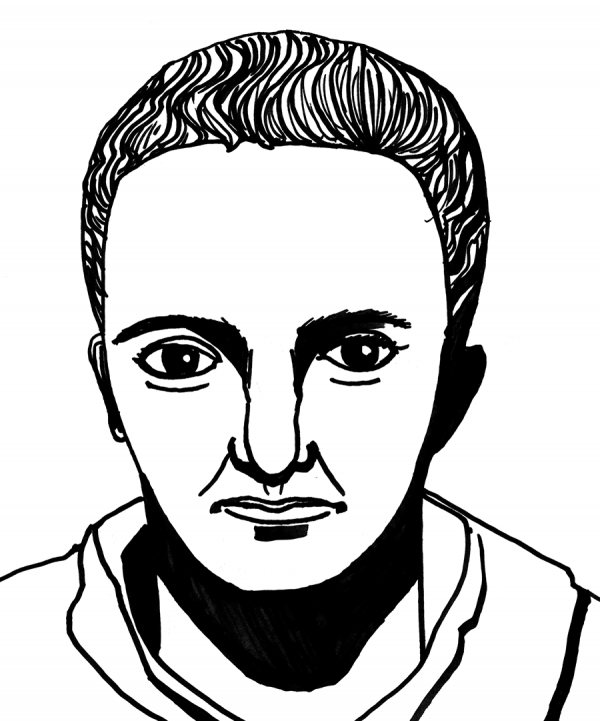 Quick Sharpie sketch of the Emperor Tiberius. Eh, meh: forehead's too big, and the whole Sharpie sketch thing, while it forces you to commit and gives you practice, is nevertheless a technique which makes it hard to get the shapes quite right. But, hey, it is quick, and it got me to bed earlier.
Quick Sharpie sketch of the Emperor Tiberius. Eh, meh: forehead's too big, and the whole Sharpie sketch thing, while it forces you to commit and gives you practice, is nevertheless a technique which makes it hard to get the shapes quite right. But, hey, it is quick, and it got me to bed earlier.
 Drawing every day.
-the Centaur
Drawing every day.
-the Centaur  Sharpie sketch of Fred Rogers. Meh - it was too hard to recover from a few small errors to make the face really look like him, even though the overall face landscape isn't too terrible.
Sharpie sketch of Fred Rogers. Meh - it was too hard to recover from a few small errors to make the face really look like him, even though the overall face landscape isn't too terrible.
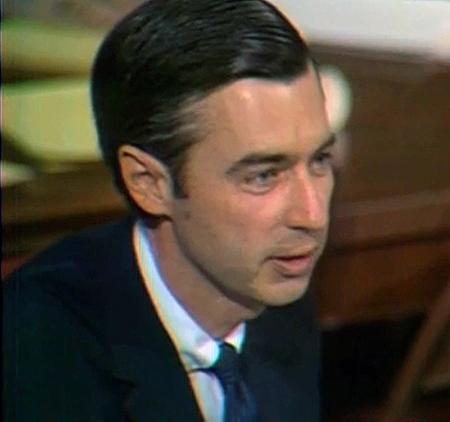 Still, it's before 3:30am, and I'm drawing every day, 30 minutes earlier this time.
-the Centaur
Still, it's before 3:30am, and I'm drawing every day, 30 minutes earlier this time.
-the Centaur 
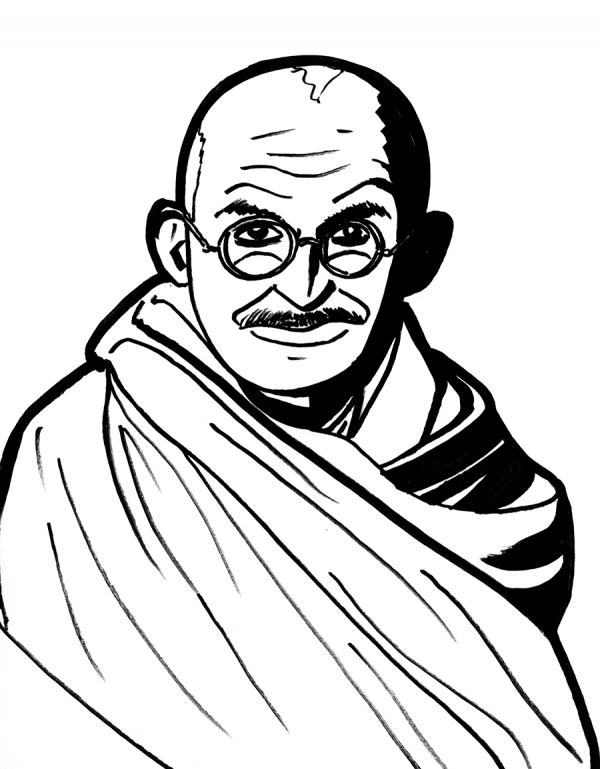 No-regrets Sharpie sketch of Mahatma Gandhi. Actually, some regrets, in that the no-roughs state of the quick sketch sometimes creates problems - like, his egg is more head shaped, scratch that, reverse it, and his smile lines cup more to the chin, and the mustache doesn't overlap enough with the nose.
Ah well.
No-regrets Sharpie sketch of Mahatma Gandhi. Actually, some regrets, in that the no-roughs state of the quick sketch sometimes creates problems - like, his egg is more head shaped, scratch that, reverse it, and his smile lines cup more to the chin, and the mustache doesn't overlap enough with the nose.
Ah well.
 But even if it's late and I'm tired, I'm still ... drawing every day.
-the Centaur
But even if it's late and I'm tired, I'm still ... drawing every day.
-the Centaur 